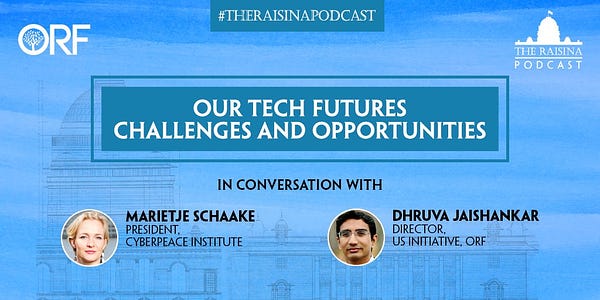Miami police used facial recognition technology in protester's arrest | What can America learn from Europe about regulating big tech? | The attack that broke Twitter is hitting dozens of companies


Follow us on Twitter. The Daily Cyber Digest focuses on the topics we work on, including cyber, critical technologies & strategic issues like foreign interference.
NBC 6 Investigators found a facial recognition program was used to identify a woman accused of throwing rocks at Miami Police officers during a protest on May 30. NBC
When the Dutch politician Marietje Schaake arrived in Silicon Valley, she realized just how bizarre American thinking about the industry had become. The New Yorker
“Phone spear phishing” attacks have been on the rise since a bitcoin scam took over the social media platform in July. Wired
ASPI ICPC
NEW REPORT: Working Smarter, Not Harder
ASPI ICPC
Rajiv Shah
Australian governments are the nation’s largest spenders on ICT, but they’re failing to maximise the leverage that market power gives them to drive improved cybersecurity and more secure supply chains. Government can harness its spending power to not only improve its own cybersecurity, but to drive better cybersecurity throughout the wider economy. However, current approaches are fragmented and having limited impact, so a concerted national effort is needed, underpinned by major strategic changes in approach.
Cybersecurity must be a key part of Australian government procurement decisions
ASPI Strategist
The Australian government’s 2020 cybersecurity strategy included a headline figure of $1.67 billion in funding. This is significant, but spread over 10 years it’s certainly not going to solve the problem on its own.


Commonwealth needs a less fragmented approach to ICT procurement to improve nation’s cyber security, according to new report
The Mandarin
Government procurement processes could improve the cyber security of supply chains through a combination of regulation and encouragement, according to Australian Strategic Policy Institute fellow Rajiv Shah. ASPI on Tuesday launched the International Cyber Policy Centre’s latest report on leveraging government procurement to improve cybersecurity and supply chains.
The World
The Attack That Broke Twitter Is Hitting Dozens of Companies
Wired
“Phone spear phishing” attacks have been on the rise since a bitcoin scam took over the social media platform in July.
Australia
Cyber strategy needs user centric design
Innovationaus
The federal government’s $1.7 billion 2020 Cyber Security Strategy document lacked the kind of strong organising principle to adequately address the cyber challenges of the less secure world, according to ANU Cyber Institute chief executive Lesley Seebeck.
USA
Oracle enters race to buy TikTok’s US operations
Financial Times
Larry Ellison’s Oracle has entered the race to acquire TikTok, the popular Chinese-owned short video app that President Donald Trump has vowed to shut down unless it is taken over by a US company by mid-November, people briefed about the matter have said. The tech company founded by Mr Ellison had held preliminary talks with TikTok’s Chinese owner, ByteDance, and was seriously considering purchasing the app’s operations in the US, Canada, Australia and New Zealand, the people said.
Miami Police Used Facial Recognition Technology in Protester's Arrest
NBC
NBC 6 Investigators found a facial recognition program was used to identify a woman accused of throwing rocks at Miami Police officers during a protest on May 30.
License plate tracking for police set to go nationwide
Cnet
A company that makes a license plate reader announces a national network for law enforcement to follow car movements. It's already in more than 700 cities.
California DMV Is Selling Drivers' Data to Private Investigators
VICE
An internal document obtained by Motherboard lists the commercial requesters for California DMV data.
China
Asia chipmaker stocks dive after Huawei ‘death sentence’
Financial Times
Billions of dollars in market value was lopped off Asia’s listed chipmakers after the US announced new sanctions on Huawei, which one analyst billed a “death sentence” for the Chinese telecoms group. “The US government has passed a death sentence on Huawei,” said Dan Wang, an analyst at Gavekal Research. “Huawei is probably finished as a maker of 5G network equipment and smartphones once its inventories run out early next year.”
America closes the last loophole in its hounding of Huawei
The Economist
In a few months the Chinese telecoms giant will run out of chips—and options.
Southeast Asia
Pro-democracy Milk Tea Alliance brews in Asia
Reuters
As Hong Kong pro-democracy advocates voiced support for Thai anti-government protests at the weekend, they used the hashtag #MilkTeaAlliance.
Pacific Islands
Huawei could pose a challenge for Australia in Papua New Guinea
The Strategist
The presence of Chinese telecommunications giant Huawei has not been challenged in Papua New Guinea as it has been in Australia, the United States, the United Kingdom and other countries. Despite a recent embarrassing setback, reported on by the Australian Financial Review, Huawei has positioned itself well to benefit from the likely full or partial privatisation by the PNG government of a number of underperforming state-owned enterprises.
South Asia
WeChat helped reunite Tibetan refugees. But at what cost?
Rest of World
Navigating China’s censorship and India’s apps ban, Tibetan refugees rethink their dependence on WeChat.
Facebook Faces Hate-Speech Questioning by Indian Lawmakers After Journal Article
WSJ
Opposition members of Parliament are acting following an article Friday in The Wall Street Journal that detailed what current and former Facebook employees said was a pattern of favoritism toward the ruling Bharatiya Janata Party and Hindu hard-liners.
Europe
What Can America Learn from Europe About Regulating Big Tech?
The New Yorker
When the Dutch politician Marietje Schaake arrived in Silicon Valley, she realized just how bizarre American thinking about the industry had become.
Middle East
General Staff of Iranian Armed Forces Warns of Tough Reaction to Any Cyber Threat
Nournews
The General Staff of the Iranian Armed Forces in a statement on Monday warned that any level of cyber threats against the country will be responded firmly and decisively.


Misc
The Lincoln Project is stealing memes — and the online left isn’t happy
The Verge
The anti-Trump Lincoln Project has a reputation for goofy memes attacking the Trump administration online, so when they posted a whimsical fancam in support of the United States Postal Service on Twitter over the weekend, it seemed par for the course.


Events
Webinar Launch - 'Spy vs Spy: The New Age of Espionage'
ASPI and Foreign Policy
The Australian Strategic Policy Institute (ASPI) and Australian Foreign Affairs is delighted to invite you to a panel discussion on the new issue of Australian Foreign Affairs: Spy vs Spy: The New Age of Espionage.
This issue of Australian Foreign Affairs explores the threat facing Australia as changes in technology enable malign actors to target individuals, officials, businesses and infrastructure – challenges that have only sharpened due to Covid-19. Speakers: Professor Anne-Marie Brady, Danielle Cave, Andrew Davies, Kim McGrath, Jonathan Pearlman and Penny Wong.
19 August 2020, 11:00am - 12:10pm.
Register to attend here.


